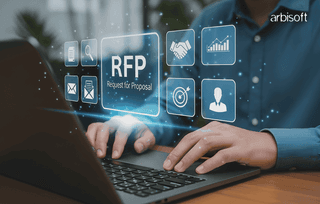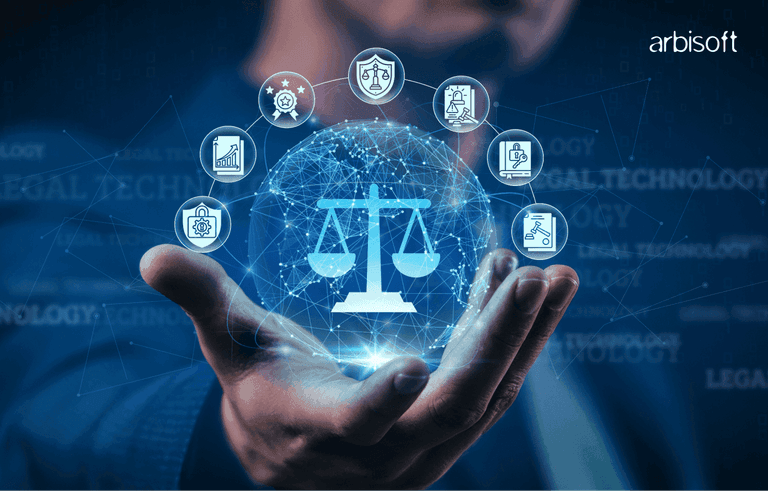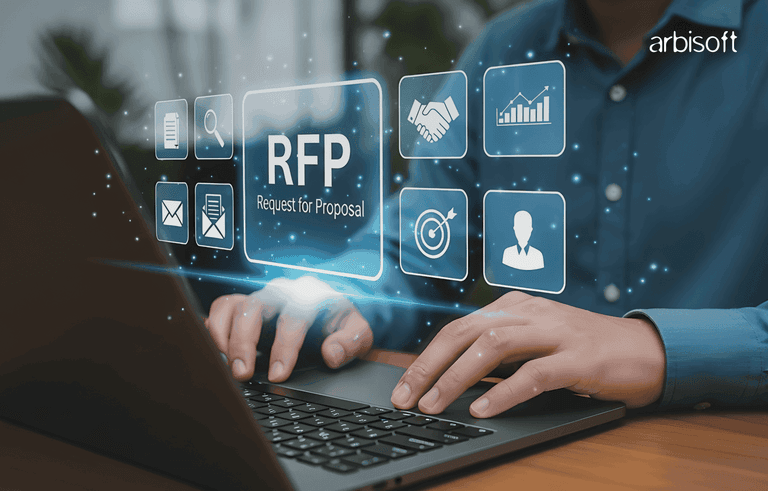We put excellence, value and quality above all - and it shows




A Technology Partnership That Goes Beyond Code

“Arbisoft has been my most trusted technology partner for now over 15 years. Arbisoft has very unique methods of recruiting and training, and the results demonstrate that. They have great teams, great positive attitudes and great communication.”
The Monetization Dilemma for AI Search Engines

AI-powered search engines are transforming search engine technology, making it quicker, smarter, and more tailored to our needs. But with this innovation comes a big question: how do you make money from something that’s so different from the traditional search engines we’re used to?
As AI reshapes our online experiences, companies must rethink their strategies, finding fresh and creative ways to earn revenue while keeping users satisfied and their privacy intact.
This shift challenges the long-standing ad-based models, pushing the industry to explore new revenue streams that align with the unique features of AI-driven search engines. Let’s dive into this complex issue and explore the potential solutions in the blog ahead.
Traditional Search Engine Monetization
For years, search engines like Google have relied heavily on advertising to generate revenue. The most common method is the pay-per-click (PPC) model, where advertisers bid on keywords and pay each time a user clicks on their ad. This model has been successful because search engines use large amounts of user data to target ads effectively, increasing the chances of clicks and revenue. Other revenue streams include display ads, sponsored content, and affiliate marketing.
The Rise of AI-Powered Search Engines
As AI continues to advance, it is significantly transforming the landscape of online search. AI-powered search engines are at the forefront of this revolution, offering users more accurate, context-aware, and personalized results, thanks in part to advanced deep learning solutions driving their innovation. These tools are not just enhancing the search experience but are also challenging traditional monetization models that have dominated the industry for years. Let’s cover some of the AI-based search engines;
Perplexity AI
Perplexity AI is one such innovative search engine that launched in 2022. It stands out for its ability to deliver precise and concise answers through advanced natural language processing (NLP) leveraging attention mechanisms. Unlike traditional search engines that focus on matching keywords, Perplexity AI understands the intent behind user queries, providing relevant information without the need for users to sift through multiple websites. This efficiency is a double-edged sword for traditional advertising models that rely on click-through rates, as users can now get their answers more directly.
SearchGPT
Another significant player is SearchGPT that leverages RLHF i.e. OpenAI's GPT-4 technology to provide highly relevant and contextually accurate search results. SearchGPT is designed to understand the deeper context of user queries, delivering direct answers that challenge the necessity of multiple clicks, further disrupting the ad-driven revenue model.
Bing AI
Bing AI by Microsoft, integrated into the Bing search engine in early 2023, takes personalization to a new level by tailoring search results based on user behavior and preferences. This advanced personalization not only makes search results more relevant but also demands new approaches to integrating advertising, as the traditional broad-based ad strategies become less effective in this context.
Google Bard
In March 2023, Google introduced Google Bard, a tool that merges AI with its search engine capabilities. Bard is designed to understand the subtleties of user queries, providing nuanced and context-aware search results. While this innovation enhances the user experience, it also introduces challenges for Google in adapting its existing monetization strategies to fit this new AI-driven format.
You.com
You.com offers a different approach, launched in 2022, by providing a customizable search experience. Users can prioritize sources and receive direct answers and AI-generated summaries, reducing the need to click through external links. This customization reduces traditional ad impressions, as the focus shifts towards satisfying user preferences rather than maximizing clicks.
Komo
Komo, launched in 2023, emphasizes a conversational and interactive search experience. By integrating AI technology with traditional search methods, Komo enhances personalization and user interaction, offering a more engaging way for users to find information. This focus on interactivity and conversation sets Komo apart from more conventional search engines, marking it as a unique player in the evolving landscape of AI-driven search tools.
Waldo
Waldo, also introduced in 2023, takes a different approach by focusing on search efficiency. Utilizing advanced machine learning algorithms, Waldo aims to streamline the search process, making it more intuitive and user-friendly. Its emphasis on delivering highly relevant results quickly enhances user engagement and contributes to the broader shift towards AI-powered search engines that prioritize efficiency and effectiveness.
Andi
Andi is another AI-powered search engine designed with a younger audience in mind. It combines conversational AI with a visual, chat-like interface, to reduce information overload and provide direct answers to user queries. Andi’s approach particularly appeals to users who prefer a more interactive and straightforward search experience.
Phind
Phind (formerly known as Hello) is tailored specifically for developers and tech professionals. It offers instant, accurate answers to technical queries by synthesizing information from across the web. Phind’s specialization makes it particularly valuable for those seeking coding help, technical documentation, or insights into complex technical subjects.
These AI-driven search engines are redefining how we interact with information online. By prioritizing user intent, personalization, and efficiency, they are not only improving the search experience but also challenging the traditional revenue models that have long underpinned the industry.
How AI Search Engines Could Disrupt Traditional Ad Models
AI search engines are disrupting traditional digital advertising by changing how users interact with search results. Historically, search engines like Google have dominated the market through pay-per-click advertising, where advertisers bid on keywords to display ads alongside search results. However, the rise of AI-powered search engines is introducing significant shifts:
1. Direct Answers and Reduced Click-Through Rates
AI search engines like Perplexity AI and SearchGPT provide users with direct and highly relevant answers within the search interface itself. According to a 2023 report by PwC, this trend is leading to a reduction in click-through rates for traditional PPC ads, as users find the information they need without clicking on external links. This shift is particularly evident in AI models like OpenAI's ChatGPT, which provide answers in a conversational format, further diminishing the necessity of browsing multiple websites.
2. Changing User Behavior and Search Efficiency
AI-driven tools like Google Bard and Bing AI personalize search results based on user behavior, reducing the number of steps needed to find information. A study by McKinsey in 2023 found that personalized search results increase user satisfaction but decrease the frequency of ad impressions. As AI engines optimize for efficiency and user intent, the traditional ad model, which relies on high visibility and CTR, becomes less effective.
3. Shift Away from Keyword-Driven Ads
The traditional keyword-based ad model is being challenged by AI search engines that prioritize user intent and context over simple keyword matching. Tools like Komo and Phind are moving towards understanding complex, technical queries, making it harder for advertisers to rely solely on keyword bidding to target users. A 2023 report from Forrester noted that AI-driven search engines could reduce the effectiveness of keyword-based ads by up to 40%, as these engines focus on delivering precise answers over broad-based search results.
4. Potential Decline in Ad Revenue
The impact of AI on ad revenue is a growing concern, prompting companies to turn to business intelligence solutions for data-driven insights to optimize their revenue strategies. According to eMarketer's 2023 forecast, Google's ad revenue, which constituted over $220 billion in 2022, could face pressure as AI-driven search engines reduce the reliance on traditional PPC models. This potential decline is fueled by AI's ability to provide direct answers, thereby decreasing the frequency of ad clicks; a critical driver of revenue for search engines.
Adapting to AI Integration
As AI-powered search engines continue to evolve, companies that rely on traditional ad models must innovate to remain competitive. The following strategies are emerging as ways to adapt:
1. Personalized and Context-Aware Advertising
AI-driven search environments offer opportunities for more personalized and context-aware ads. According to a 2023 report by Accenture, integrating AI into ad targeting could increase ad relevance by up to 30%, as ads can be tailored to the specific needs and preferences of users. For example, if someone is searching for vacation spots, the AI might show them a perfect travel package right in the search results.
2. Innovative Ad Formats
As the traditional ad formats grow, companies are experimenting with new interactive and conversational ad formats that blend smoothly with AI-driven interfaces. For instance, ads could become part of the AI's response, offering personalized suggestions or products based on the user's query. Google and Microsoft are reportedly exploring these ad formats, aiming to integrate them into their AI offerings by 2024, as per a 2023 Gartner report.
3. AI-Enhanced Ad Targeting
Companies like Google and Microsoft are investing heavily in AI to enhance ad targeting capabilities. By leveraging AI and machine learning algorithms, advertisers can analyze vast amounts of data to deliver highly relevant ads. A McKinsey report from 2023 highlighted that companies using AI for ad targeting saw a 15-20% increase in ROI, demonstrating the potential of AI to refine ad strategies effectively.
4. Exploring Alternative Revenue Models
With the traditional ad model under pressure, companies are exploring alternative revenue streams. Subscription-based services, premium content offerings, and strategic partnerships are becoming more prominent. For example, Google has been experimenting with subscription models for ad-free search experiences, while AI search engines like You.com are focusing on premium services that prioritize user customization and privacy.
In short, AI-powered search engines are fundamentally changing digital advertising. While they present challenges to traditional ad models, they also offer new opportunities for innovation in personalized and context-aware advertising. Companies that adapt to these changes and incorporate AI-driven strategies are likely to maintain their competitive edge in this dynamic market.
New Ways for AI Search Engines to Make Money
As AI search engines evolve, they are finding new ways to make money that fit their advanced technology. Here’s how they’re doing it:
1. Subscription Services
Some AI search engines are starting to offer subscription services. For example, You.com offers premium features like faster results and extra tools for a fee. This helps them earn money without relying on traditional ads. A 2023 Deloitte report noted that while paid subscriptions can provide steady income, getting users to pay for what they’re used to getting for free can be difficult. The success of this model depends on how much extra value the subscription offers.
2. Sponsored Content and Partnerships
AI search engines can work with brands to show sponsored content directly in search results. For example, if you search for product recommendations, you might see sponsored options that fit your search. This approach needs to be done carefully to keep users’ trust. A 2024 PwC report stressed that keeping sponsored content relevant and transparent helps maintain user trust while integrating ads smoothly.
3. Ethical Data Monetization
Another way to make money is by using user data responsibly. AI search engines can collect data in a way that protects privacy and sells insights to businesses. For instance, Google is exploring ways to use data without compromising user privacy. A 2023 McKinsey report found that if users believe their data is handled ethically, it can become a valuable revenue source.
4. E-commerce Integration
Some AI search engines, like Bing AI, are adding shopping features directly into search results. This means you can buy products right from the search page. They earn money by getting a commission on each sale. A 2023 eMarketer study showed that integrating shopping options into search results can boost revenue, especially as online shopping grows.
5. Contextual and Personalized Ads
While traditional ads might not fit well with AI searches, new types of ads can be more relevant. For example, ads that match the exact intent of the search query can be less annoying and more useful. A 2024 Forrester report highlighted that personalized ads, which align closely with user interests, are becoming more popular and can be a good fit for AI search engines.
What This Means for Google
As AI search engines like SearchGPT, You.com, and Bard become more popular, Google may need to diversify its revenue streams to stay competitive. Some potential alternatives include:
- Expanding Cloud Services: Google could focus more on its cloud computing and AI services, which are already significant revenue sources. By offering advanced AI and machine learning tools to businesses, Google can create new income streams.
- Offering AI Tools and Services: Google could capitalize on its AI expertise by offering tools and services directly to consumers and businesses. This could include AI-driven analytics or content creation tools, opening up new revenue opportunities.
- Focusing on Hardware: Google might also increase its focus on hardware products like Pixel phones and Nest smart home devices. These products could serve as platforms for integrating AI services, creating new ways to generate revenue beyond ads.
Conclusion
Monetizing AI search engines presents a complex challenge that requires innovative solutions. As traditional ad models face disruption from AI-driven platforms, companies must adapt to a changing landscape where users expect direct, relevant answers without intrusive ads.
The future of AI search engine monetization will likely involve a combination of subscription services, ethical data use, e-commerce integration, and new ad formats. Companies that successfully navigate these changes will be those that can balance user experience, privacy, and profitability in a transparent and sustainable way.
























